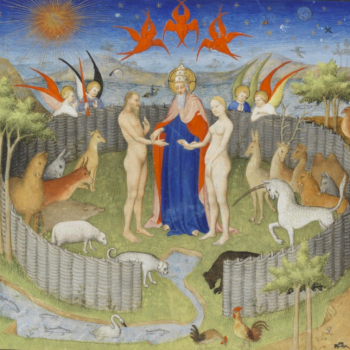Augustine, City of God, Book XIV Chapter 28
"Of The Nature Of The Two Cities, The Earthly And The Heavenly"
Accordingly, two cities have been formed by two loves: the earthly by the love of self, even to the contempt of God; the heavenly by the love of God, even to the contempt of self. The former, in a word, glories in itself, the latter in the Lord. For the one seeks glory from men; but the greatest glory of the other is God, the witness of conscience. The one lifts up its head in its own glory; the other says to its God, "Thou art my glory, and the lifter up of mine head." In the one, the princes and the nations it subdues are ruled by the love of ruling; in the other, the princes and the subjects serve one another in love, the latter obeying, while the former take thought for all. The one delights in its own strength, represented in the persons of its rulers; the other says to its God, "I will love Thee, O Lord, my strength."
The other night, I was a guest on an hour-long Christian radio show. The host and I had a good conversation, despite some obvious disagreements, but what made the biggest impression on me were the commercials that bracketed my time on the air: messages promoting tourism in the Holy Land (a place "God has truly blessed"), gold as a buffer against oncoming disaster, and commercials extolling America as "the wonder of the modern world" and celebrating "God's hand in American history."
According to these commercials (and much I have been reading and hearing lately), America was founded on the principles of Christianity, and thus has also been truly blessed. The phrase, "American exceptionalism" has been repeated over and over in the public square. You may run in circles where it doesn't show up, so be advised that in some discourse communities "American exceptionalism" has become a new litmus test for Americanism.
President Barack Obama has been taken to task for denying America's exceptionalism (without cause, as Andrew Sullivan notes in The Atlantic); Governor Sarah Palin gave a recent speech in which she repeated the phrase "American exceptionalism" to considerable effect (suggesting that this will be an applause line for her for the next few years); and Florida Senator-elect Marco Rubio, the poster boy of the Tea Party movement, enumerated several of the principles of American exceptionalism in his acceptance speech: "Americans believe with all their hearts . . . that the United States of America is simply the single greatest nation in all of human history, a place without equal in the history of all mankind."
(Which is to say, I guess, greater than the democratic age of Athens, greater than Renaissance Florence, greater than Elizabethan England. Let us celebrate, for we are indeed a substantial people!)
In simple form, American exceptionalism postulates that America is a nation, as Rubio suggests, superior to all other nations and called to great things because of our unique status on the world stage and in world history. The religious variety of American exceptionalism suggests that God favors us; the proof is in the unlikely success of the American Experiment.
This is, however, reasoning backward from effects to causes, and as a theologian, it's my job to ask: However widespread the belief might be, can one argue from scripture, reason, and Christian tradition that God has chosen America?
Or has America chosen to be chosen?
Because this may be an entirely different matter.
However we explain it, Americans have long understood themselves to be exceptional. The storm-tossed colonists listening to John Winthrop's sermon, "A Model of Christian Charity," in 1630 were invited to imagine themselves a city on a hill, called by God to a special destiny. At our best, I think we have been that. Speaking of destiny, the 19th-century concept of Manifest Destiny postulated that God predestined the spread of the United States from sea to shining sea. This proved to be at least geographically true, although I don't know that God approved of our every step in achieving that destiny. More recently, America has been cast as a crusading nation actually doing God's work. In his post 9/11 national prayer service speech of September 14, 2001 (which contained many beautiful sentiments with which I whole-heartedly agreed), President George W. Bush also remarked that "our responsibility to history is already clear: to answer these attacks and rid the world of evil."





